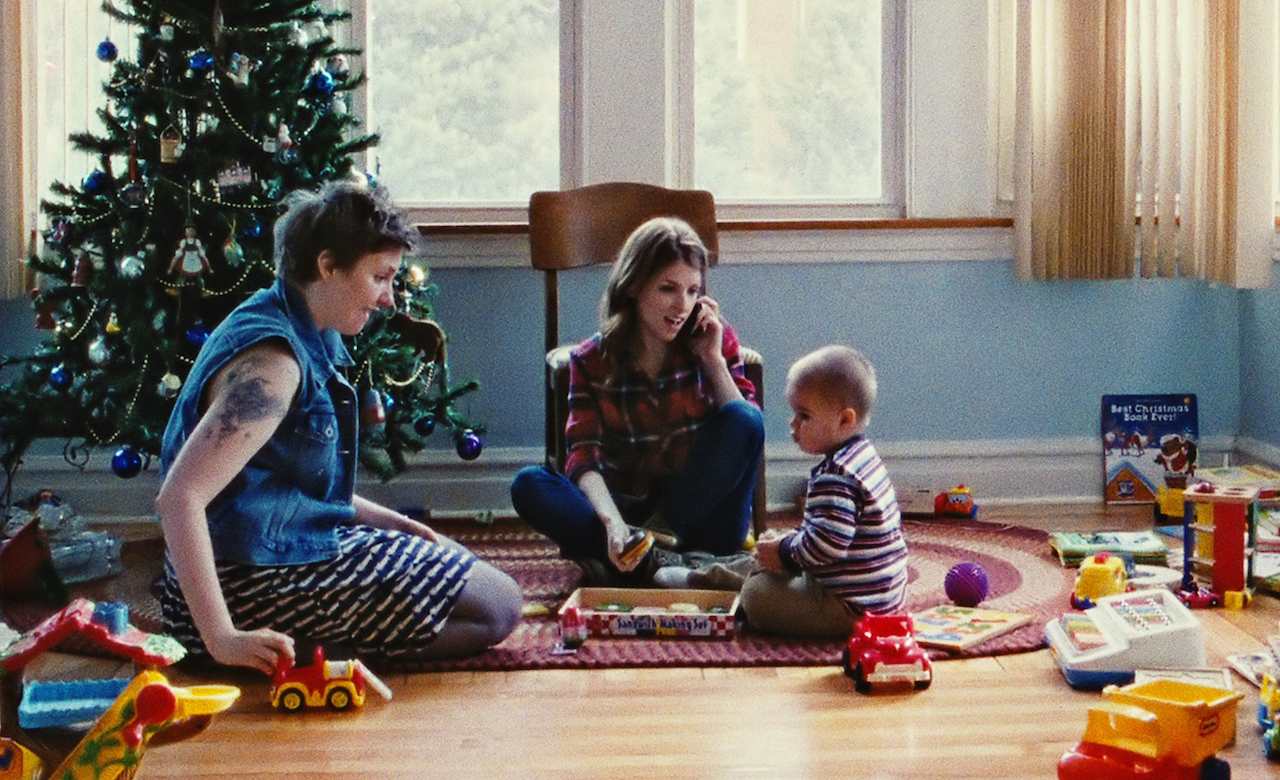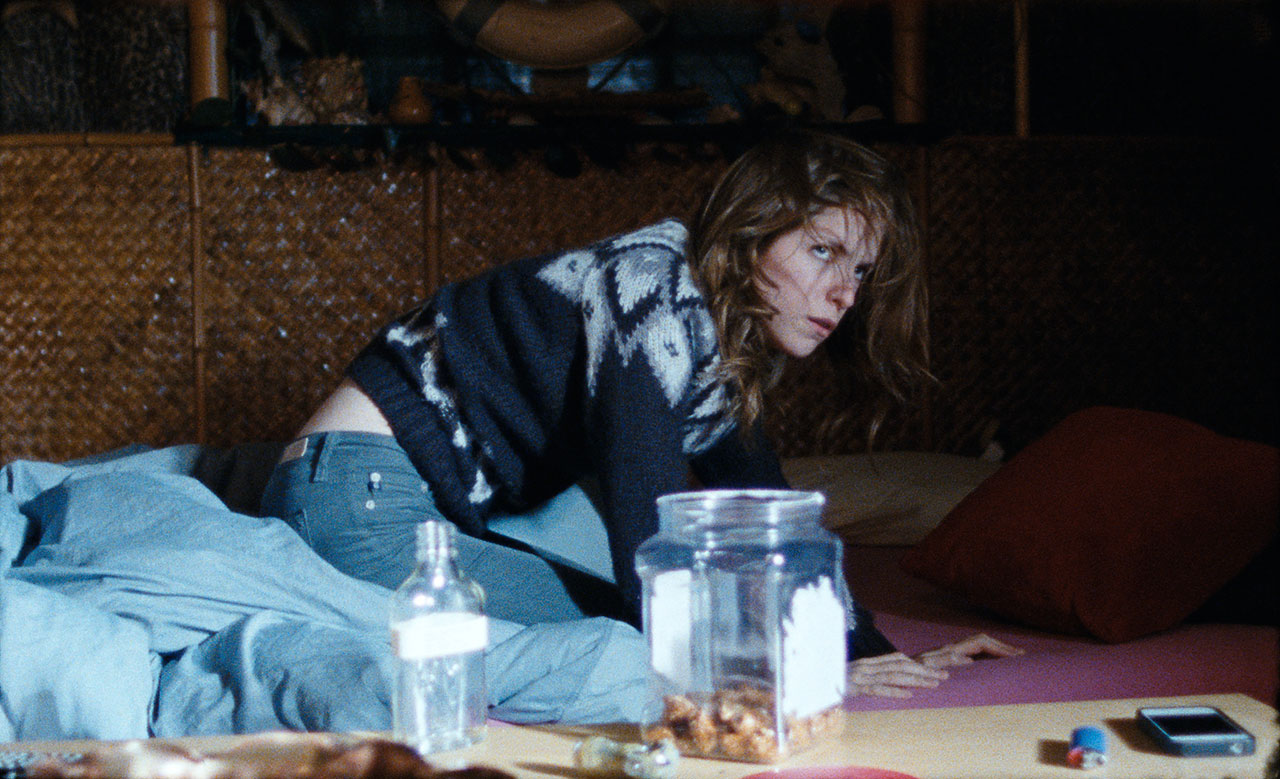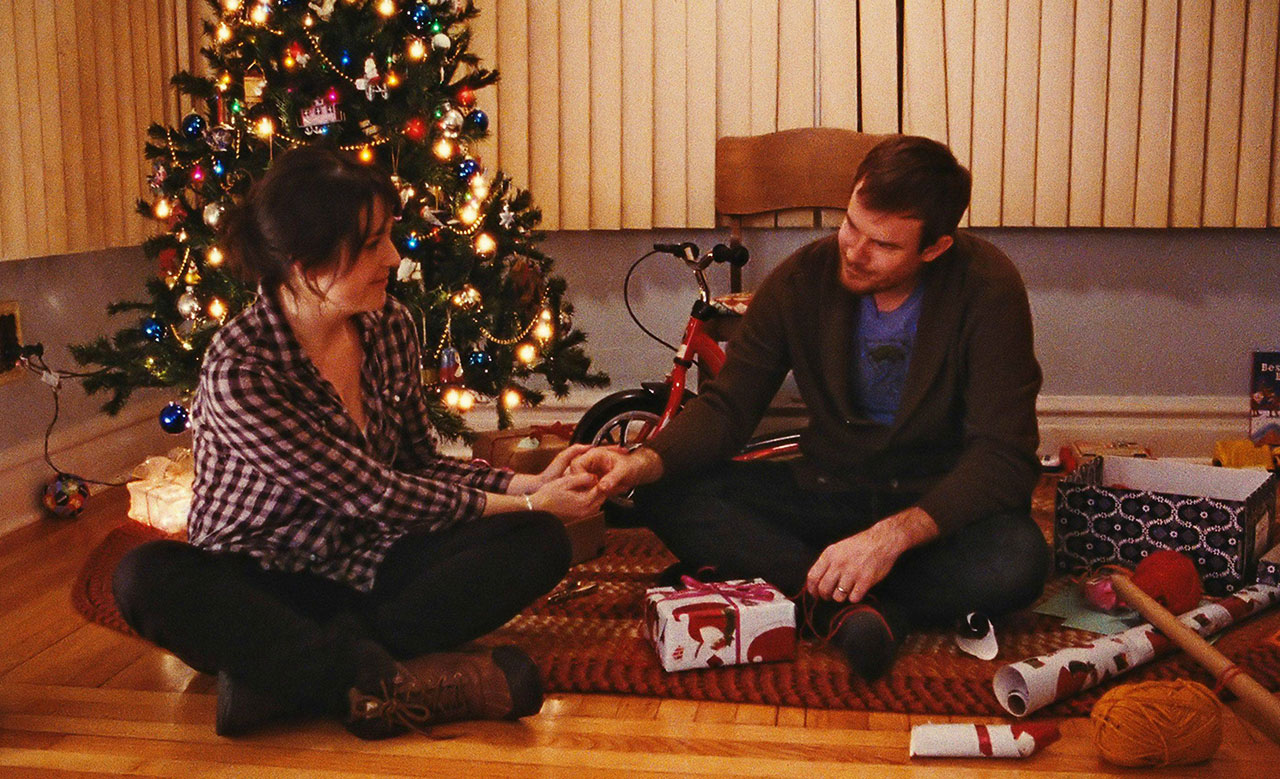Improvising a Christmas Movie with Director Joe Swanberg
Anna Kendrick and Lena Dunham riffing the next 50 Shades of Grey. You can't write this stuff.
Most filmmakers are considered prolific if they make a movie every two years. Since leaping onto the scene in 2005, Joe Swanberg has made 18. One of the leading figures of the mumblecore movement (an American indie film subgenre characterised by microscopic budgets and heavily improvised dialogue), Swanberg most recently earned plaudits for his charming romantic dramedy Drinking Buddies, starring Olivia Wilde and Anna Kendrick.
We now know Drinking Buddies was scarcely in theatres before Swanberg began work on his next project, one that sees him re-team with Kendrick, along with New Zealand actress Melanie Lynskey and Girls creator Lena Dunham. Shot in Swanberg's cosy Chicago home, Happy Christmas chronicles the rocky yuletide holidays of new parents Jeff and Kelly (Swanberg and Lynskey) after Jeff's irresponsible sister Jenny (Kendrick) comes to stay. As with most of Swanberg's movies, the film had almost no scripted dialogue, and relied instead on the improvisational talents of the cast.
We chat to Swanberg about the origins of the story, as well as his decidedly laidback approach to feature filmmaking.
![]()
Is it true that the original script for Happy Christmas was only 15 pages long?
Yeah that's right. It was in paragraph form, sort of a breakdown of what I thought would happen in each scene.
What is it about that approach to storytelling that you like?
Well there's a couple of things. I really love the fact that as a writer, I'm not putting dialogue into character's mouths, and that I'm having the actors own their characters and bring all these different viewpoints to them. I also like showing up to work each day not sure what's going to happen, and having those scenes be a true collaboration between myself and the actors and my cinematographer and my producers ... having ten smart people solving a problem rather than me sitting at a laptop trying to write a screenplay.
So where do your films tend to start, if not a full script?
Sometimes it's a theme that I'm interested in, and other times it's a character, but either way I tend to cast pretty early in the process. I want to know who I'm going to be working with, and then that collaboration with the actor is there at the beginning of the process, and I can work with them to flesh out that character.
By the time we get there to shoot the movie, I have a pretty good sense of the arc of it, but it's really all the nuances and all the personality that we find on set. If you were ever to look at one of my outlines, it would read like the finished movie, but missing everything that makes the movie good (laughs).
And in the case of Happy Christmas, what was your creative inspiration?
It was two things, actually, both of them autobiographical. It was my younger brother coming to live with my wife and I soon after my son was born, and the experience of starting my own family and having a sibling in the house, which was wonderful and terrible, depending on the day. So I kind of took that feeling and tried to put it in there.
And then there were conversations I was having with my wife about motherhood and about her kind of identity crisis she was having as an artist and an independent person, wrapping her head around the idea of being a stay-at-home mum. Just circumstantially we found ourselves in these very conservative, classic gender roles of the bread winner and the stay-at-home mum, which is not something that we really identified with. So it was a weird period of time for us. And I didn't feel like I had seen that in a movie before. So I took these two life events that in reality happened a year apart from each other, and then just crashed them together into a movie.
One of the things I really appreciated about the film, and about a lot of your films, is the attention given to female characters. Is that something you're particularly conscious of?
Yeah, it's important for me. Just as a person, I feel like I know what it's like to be a man, whereas I have no idea what it's like to be a woman, so it's subject matter that I'm just drawn to through my own curiosity. And also it's just so underrepresented in the movies. It's sadly pretty rare to have interesting, strong female characters. I've always wanted to make movies in territory that's underexplored, and where there's still room for discovering. So I feel like again and again I keep getting drawn back there because there's so much undiscovered country. And it's a chance to work with great actresses who don't get offered leading roles all that often.
Given how much improvisation happens in the your films, how much footage do you usually end up with?
There have been movies where I've ended up with mountains of footage, and others where we shot almost everything in the movie. It really depends. With Happy Christmas we shot on 16 millimetre [film], so I budgeted a 4:1 shooting ratio, and I think we stuck pretty close to that. Certain scenes we only shot once or twice, other scenes we shot ten times. It ended up being not that much footage. I think when you shoot film you have to be smart about preplanning in a different kind of way. When I shoot video I'm a little more apt to just shoot a lot on set. On my previous film Drinking Buddies, I probably shot about thirty hours of stuff, and with Happy Christmas I probably shot five or six. It really just depends.
And why did you shoot on film?
I went to film school and my whole education was on 16mm, so I was excited to try that again in a professional context. And also I'll admit I was a little bit worried that film was going to disappear and that I was never going to shoot a full feature on film. So there was a bit of fear and nostalgia going into that decision. But it felt right for the project, and I think I was just waiting for the kind of movie that felt like it wanted that texture and that kind of visual look, so it all lined up. The Christmas season, and the fact that it focused on a family; I think I wanted that warm, grainy, old home movie look that only film can provide.
Are you often surprised by what your cast improvises on set?
Definitely. It's one of the fun things about working this way. In almost every scene there's some moment that I feel like I never could have written. It's too human and too spontaneous to have been generated in the screenplay process. That's kind of what keeps me going every day. I show up to set each morning hoping that we get something like that and that I'm surprised by what happens. I want to make sure that the movies are flexible enough that if something really exciting happens that wasn't in the outline, there's room to incorporate that, and that the movie can follow what's actually happening, rather than following some predetermined game plan.
And in the case of Happy Christmas, what's one example of that kind of moment, something that got you excited to be there?
I had this idea that I wanted the women to write this 50 Shades of Grey-style erotic novel, and so those are scenes in the outline where I didn't write anything other than 'the three women sit in the office and write the book', because I really wanted Anna and Melanie and Lena to improvise that stuff. I wanted to be surprised by the story they came up with, and how crude they got with it. So that stuff was really fun; it was all just totally playing around and letting them run wild.
I was also really proud of and excited by this central conversation in the middle of the movie where again the three women are sitting down in the basement drinking beers together and talking about motherhood and responsibility. That was a really important scene for me because thematically it's a big shift moment in terms of the story we're telling, and also it was a big impetus for wanting to make the movie in the first place. I think they did such a great job, and I think those three actresses are so smart, and such great writers. You hope it's going to go that well, but it still feels really good when you finish at the end of the day and you feel like you actually got the thing that you were hoping to get.
Happy Christmas is available now on DVD and digital download.








